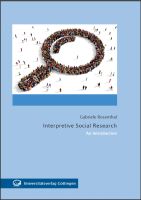Interpretive Social Research - An Introduction
| dc.contributor.author | Rosenthal, Gabriele, | |
| dc.date.accessioned | 2018-10-01 23:55:55 | |
| dc.date.accessioned | 2019-11-28 14:10:54 | |
| dc.date.accessioned | 2020-04-01T11:56:27Z | |
| dc.date.available | 2020-04-01T11:56:27Z | |
| dc.date.issued | 2018 | |
| dc.identifier | 1002466 | |
| dc.identifier | OCN: 1082954859 | en_US |
| dc.identifier.uri | http://library.oapen.org/handle/20.500.12657/27538 | |
| dc.description.abstract | This volume is a clear introduction to methods of data collection and analysis in the social sciences, with a special focus on interpretive methods based on a logic of discovering hypotheses and grounded theories. The chief methods presented are participant observation, open interviews and biographical case reconstruction. The special advantages of interpretive methods, as against other qualitative methods, are revealed by comparing them to content analysis. Empirical examples show how the methods presented can be implemented in practice, and concrete problems connected with conducting empirical research are discussed. By presenting individual case studies, the author shows how to apply the principle of openness when collecting empirical data, whether through interviews or observations, and she offers rules for analysis based on the principles of reconstruction and sequentiality. | |
| dc.language | English | |
| dc.subject.classification | thema EDItEUR::J Society and Social Sciences | en_US |
| dc.subject.other | social research | |
| dc.subject.other | Textbook | |
| dc.title | Interpretive Social Research - An Introduction | |
| dc.type | book | |
| oapen.abstract.otherlanguage | This volume is a clear introduction to methods of data collection and analysis in the social sciences, with a special focus on interpretive methods based on a logic of discovering hypotheses and grounded theories. The chief methods presented are participant observation, open interviews and biographical case reconstruction. The special advantages of interpretive methods, as against other qualitative methods, are revealed by comparing them to content analysis. Empirical examples show how the methods presented can be implemented in practice, and concrete problems connected with conducting empirical research are discussed. By presenting individual case studies, the author shows how to apply the principle of openness when collecting empirical data, whether through interviews or observations, and she offers rules for analysis based on the principles of reconstruction and sequentiality. | |
| oapen.identifier.doi | 10.17875/gup2018-1103 | |
| oapen.relation.isPublishedBy | ffaff15c-73ed-45cd-8be1-56a881b51f62 | |
| oapen.collection | AG Universitätsverlage | |
| oapen.identifier.ocn | 1082954859 |

